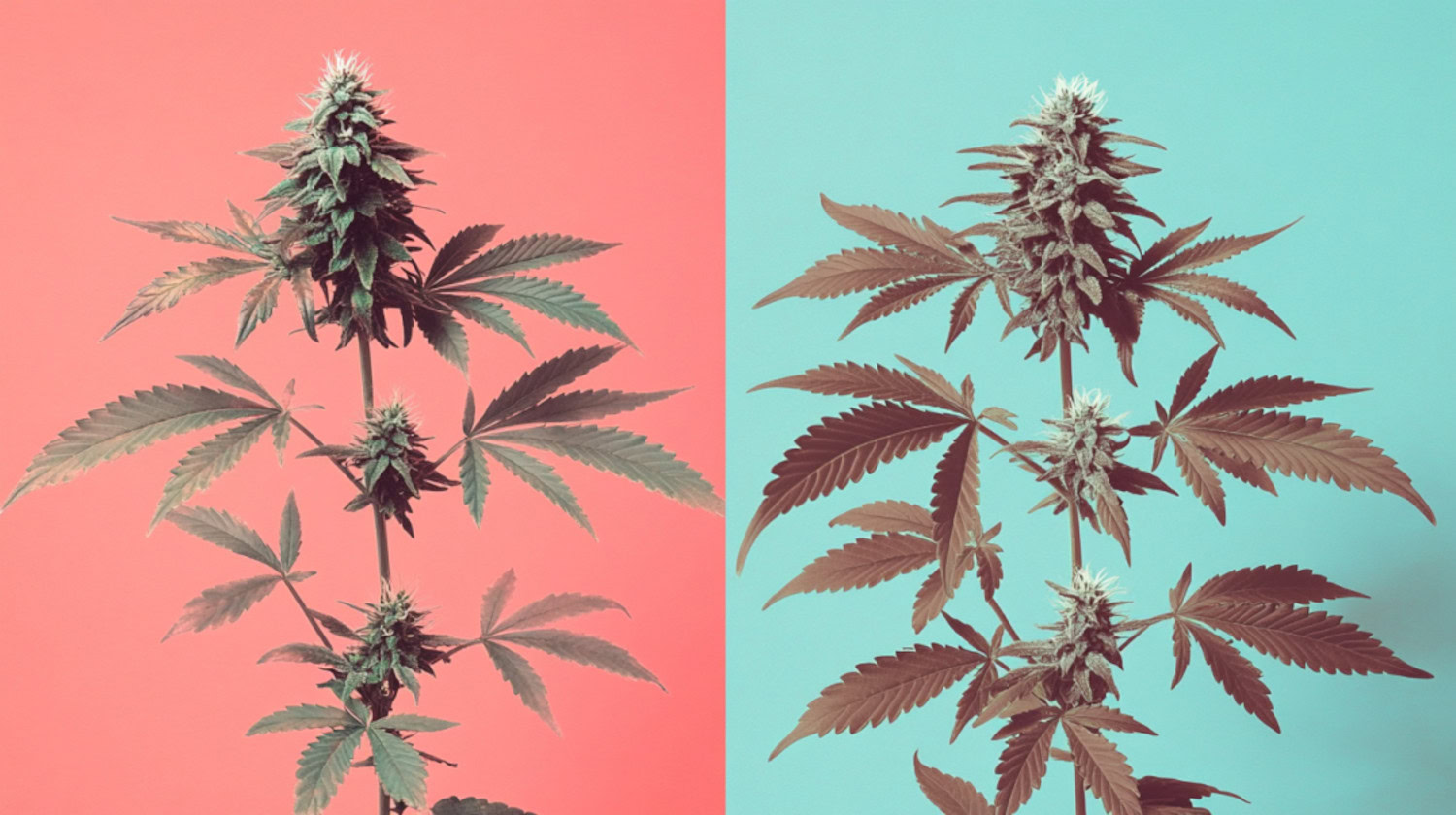Diarrhea is an uncomfortable but common experience characterized by loose, watery stool that can vary from mild to severe. Some people (and even animals) experience it as frequently as a few times a year.
Though the condition usually clears up on its own or with mild remedies within a few days, it should be monitored carefully because it can cause dehydration, which is a symptom that can be life-threatening without treatment. Those with chronic digestive issues often look for the causes of the situation and other methods of relief.
The discomfort is often caused by bacteria, but a myriad of other factors can induce the unpleasant experience. With the rise in popularity of cannabis and infused products, many people have turned to cannabis for relief from a variety of ailments. The plant is known for its cannabinoids, like THC and CBD, and their therapeutic effects. However, some consumers may experience adverse side effects at times.
Whether CBD is hemp-derived or cannabis-derived, the cannabinoid has been studied for its effects on various parts of the body through its interaction with the endocannabinoid system (ECS).
This has left many users wondering: can CBD cause diarrhea?
This article will discuss the causes of diarrhea, how CBD can affect the ECS, ways to avoid unwanted effects on your digestive system, and even how CBD may affect your pets.
Does CBD Cause Diarrhea?
It is understood that the ECS helps maintain homeostasis of the many systems of the body, including the gastrointestinal tract.1 And while CBD interacts with the ECS, research specifically addressing whether CBD can cause diarrhea is limited.
It’s most often concluded that cannabidiol (CBD) cannot be acknowledged as the sole cause of diarrhea.
- A 2019 review of the adverse effects of CBD on both humans and animals noted a small sample group experienced diarrhea while taking CBD, but researchers acknowledge that several other factors may have played a role in the side effect of diarrhea.2
- Researchers in a study of participants with a childhood seizure disorder known as Dravet Syndrome monitored the results of two groups administered either CBD or a placebo dose. However, patients in this study were also simultaneously taking an average of 3 other antiepileptic medications, and researchers cannot confirm the role CBD played in the development of any adverse effects.3
- Another study documented the effects of CBD on patients with no treatment-resistant schizophrenia or related psychotic disorders. They found that 35% of patients administered 1,000 mg of CBD for an average of 43 days experienced adverse side effects. And while a small percentage of patients did experience diarrhea, researchers cannot confirm if CBD or other non-specified antipsychotics that they were taking contributed to the undesirable effect.4
- One case study analyzed a woman with microscopic colitis (MC) – chronic colon inflammation in which one of the most common symptoms is diarrhea. While she reported increased episodes of diarrhea while taking CBD oil, researchers weren't able to determine if CBD or other ingredients in the gel capsule were the primary cause.5
So, the question remains: does CBD cause diarrhea?
A 2016 review noted that cannabinoid receptors are distributed throughout the gastrointestinal tract. Researchers have concluded that some cannabinoids, like CBD and CBG, might have therapeutic effects on the digestive tract, like anti-inflammation, abdominal pain, nausea, and diarrhea.6 And many medical cannabis patients use the plant to treat digestive issues like irritable bowel syndrome (IBS) and inflammatory bowel disease (IBD).
It should be noted that the relationship between CBD and causes of diarrhea is likely influenced by numerous other internal and external factors, like medications and medical conditions. And by affecting the GI tract through the endocannabinoid system, it can't be ruled out that these cannabinoids could increase the likelihood of adverse effects in some patients, which can include diarrhea.7
Speak with your doctor if you are concerned about the effects CBD may have on your bowel movements.
What Could Be Causing Diarrhea If It Isn't CBD?

While cannabinoids like CBD work to relax the body, they can make it easier to feel the need to poop. This doesn't mean CBD is causing diarrhea, but it may play a role when combined with other causes. And this can lead some consumers to believe CBD is to blame when there are other triggers to be mindful of.
- Consumption method - CBD can be consumed through smoking bowls or joints, eating edibles, ingesting tinctures, or applying topicals or transdermals. Edibles include other ingredients that may stimulate or aggravate the digestive system to cause diarrhea, in addition to the effects CBD may have on the body.
- Dosage – Cannabis is full of biphasic molecules,8 meaning that in low doses, they affect the body differently than in high doses. Just as higher amounts of THC are more likely to cause adverse effects, higher amounts of CBD may stimulate the digestive tract more than smaller doses. Combined with other factors, this increased stimulation could lead to a greater need to use the restroom. If you have concerns about your dosage, you should consult with your medical cannabis doctor.
- Quality – Cannabis is a bio-accumulator,9 so it absorbs the nutrients and responds to the environment it is grown in. Cannabis is grown in different environments, each with its own variables of elements like light, water, and soil that can affect the final quality of the buds. If you experience diarrhea after consuming cannabis, it may be a matter of environmental contaminants rather than CBD. This is why it's important to shop at licensed dispensaries that thoroughly test their products.
Likewise, make sure the product you are using isn’t expired or moldy.
While higher-priced products may not guarantee a high-quality product, high-quality products may reduce the likelihood of experiencing any adverse effects.
- Endocannabinoid system response – The endocannabinoid system maintains the homeostasis of various body systems, including the GI tract. Each individual’s ECS may respond to cannabis differently. To get a better understanding of your ECS, take note of how cannabis or CBD makes you feel after each session or dose.
- Existing conditions – Similar to the case study of the woman with MC, existing conditions may have symptoms of diarrhea. By stimulating the GI tract, it's possible CBD may raise awareness of the need to poop (rather than creating the need).
- Medications – As observed in several research studies, other medications taken along with CBD may be more likely to cause effects like diarrhea. If you are taking medications for other conditions, consult with your doctor before adding cannabis or CBD to your regime.
- Appetite or “Munchies” – If you are consuming a CBD isolate product or a high CBD to THC ratio, you’re not likely to get the munchies, but products high in THC may induce your appetite. If you’re prone to diarrhea or have a GI condition, be mindful of what you eat when hunger strikes.
Are There Any CBD Products That Can Cause Diarrhea?

CBD can be consumed through different methods, like smoking, eating, or applying directly to the skin. Each method delivers the cannabinoid to the ECS slightly differently, affecting how it interacts with and relaxes the GI tract, especially in higher dosages.
Tinctures are alcohol or oil-based liquids infused with cannabinoids like CBD, which have become increasingly popular. They can be infused into different types of oil, like MCT, which usually comes from coconut. Ingesting large amounts of coconut and MCT oil have been linked to effects like gastrointestinal discomfort. If you are concerned about diarrhea as a side effect when consuming CBD oil, try to find products that are made without MCT oil.
Similarly, edibles may contain other ingredients that can trigger diarrhea by aggravating existing sensitivities or GI issues. Legal CBD edibles should be clearly labeled with ingredients to find one that suits your needs. If you make edibles yourself, you’ll be able to tailor the recipe to your dietary needs.
How to Avoid Diarrhea When Taking CBD

Cannabinoids, like CBD, naturally affect the digestive system through their interaction via the ECS. When combined with other ingredients or medical factors, it has the potential to stimulate the GI tract.
If you’re worried about CBD causing digestive issues like diarrhea, keep the following tips in mind:
- Consumption method - If consuming edibles or tinctures, stick to products with the fewest added ingredients. Tinctures, oils, and edibles may have ingredients that are more likely to cause gastrointestinal discomfort. Consume these types of CBD products mindfully. If vaping or smoking, keep in mind that CBD can raise awareness about the need to poop, and pause your consumption if you feel your stomach may become upset. Topicals only affect a localized area and don’t enter the bloodstream like other methods, so they most likely won’t trigger effects in the GI tract.
- Dosage – If you’re unsure if CBD causes you to have diarrhea and it is of concern to you, start with a light dosage. If you are comfortable and need to, increase your dosage of CBD in small increments to reduce the likelihood of adverse effects like diarrhea.
- Quality – Make sure you purchase CBD products from legally licensed retailers, growers, or producers you trust (sometimes growing your own CBD or making your own products like edibles is some of the highest quality). Consume fresh products that have been made and stored correctly to avoid unwanted contaminants.
- Endocannabinoid system response – The ECS maintains homeostasis throughout the body and has receptors in the digestive system. Some people may be more sensitive to the effects of increased sensitivity in the GI tract. If you regularly have to use the bathroom after consuming cannabis, take note of how each session or dosage makes you feel so you can find the right amount for you.
- Existing conditions – If you already have issues related to the GI tract, speak with your doctor about CBD. While many medical cannabis patients use CBD to help alleviate IBS and IBD, the cannabinoid plays a role in relaxing the digestive system. Consulting with your doctor can help you find the right product and dosage for your needs.
- Appetite or “Munchies” – While high CBD products may not cause the munchies, ratioed THC:CBD products may. Eating food you know doesn’t irritate your stomach may be best if you have digestive conditions or are prone to diarrhea.
What About Pets? Can CBD Cause Diarrhea in Dogs?

All animals – vertebrates and invertebrates – have been found to have an endocannabinoid system. However, they don’t respond to cannabis in the same way that humans do. The intoxicating effects of THC on animals, specifically dogs, have been shown to be “undesirable” and toxic, while CBD has been demonstrated to be safe for consumption.10
A 2022 study of CBD and dogs found that there was evidence to support that the cannabinoid helped reduce pain in dogs with osteoarthritis and increased their activity levels.11 Another report concluded that CBD was able to reduce inflammation in dogs but recognized the lack of data to support the claim and called for further research.12
Despite the limited studies on how cannabis or CBD affects animals, most findings indicate positive therapeutic benefits. Many items have entered pet store shelves, with most formulated for dogs. These infused CBD products often come in the form of oral tinctures or oils, leading pet owners to question: can CBD cause diarrhea in dogs?
Possibly.
Just as every cannabis experience is unique to the individual, the same is true for animals. There have been occurrences where dogs have experienced episodes of diarrhea after CBD oil consumption,13 so it can happen. Other studies have shown little to no effects on the digestive system of dogs when they have consumed CBD oil, but the researchers did cite case studies where it has happened.14
While CBD and its infused products are considered generally safe for pets, adverse effects are still possible. Besides diarrhea, CBD may cause effects including dry mouth, low blood pressure, or drowsiness.
It is unknown what may trigger adverse effects, but it may be due to the animal's ECS, underlying health conditions, the dosage of CBD, or the ingredients in the product you’re dispensing to them.
Similar to humans – and maybe even more so because of communication barriers – it is crucial that you speak with your veterinarian to determine if CBD is a suitable treatment option for your pet.
Conclusion
Current research has indicated a link between CBD, the endocannabinoid system, and the gastrointestinal tract in animals and humans. The anti-inflammatory properties of the cannabinoid make it an ideal treatment for some users. Still, the relaxing properties may induce unwanted side effects relating to the digestive system.
Although it is unclear what triggers the uncomfortable experience of diarrhea, researchers hypothesize that it may be due to other elements, including:
- Existing medical conditions, especially those related to the GI tract.
- Medications that may not mix with CBD or its products’ ingredients.
- High doses of CBD which naturally cause the digestive system to relax.
- The additive ingredients of CBD products like MCT oil.
These conditions may be valid in the case of both humans and animals. Before adding CBD to your or your pet’s health routine, speak with a medical doctor or veterinarian.
Sources:
1. Hasenoehrl, C., et al. “The Gastrointestinal Tract - a Central Organ of Cannabinoid Signaling in Health and Disease.” Neurogastroenterology & Motility, vol. 28, no. 12, 26 Aug. 2016, pp. 1765–1780, https://doi.org/10.1111/nmo.12931.
2. Huestis, Marilyn A., et al. “Cannabidiol Adverse Effects and Toxicity.” Current Neuropharmacology, vol. 17, no. 10, 2019, pp. 974–989, www.ncbi.nlm.nih.gov/pubmed/31161980, https://doi.org/10.2174/1570159X17666190603171901.
3. Devinsky, Orrin, et al. “Trial of Cannabidiol for Drug-Resistant Seizures in the Dravet Syndrome.” The New England Journal of Medicine, vol. 376, no. 21, 2017, pp. 2011–2020, www.ncbi.nlm.nih.gov/pubmed/28538134, https://doi.org/10.1056/NEJMoa1611618.
4. McGuire, Philip, et al. “Cannabidiol (CBD) as an Adjunctive Therapy in Schizophrenia: A Multicenter Randomized Controlled Trial.” American Journal of Psychiatry, vol. 175, no. 3, Mar. 2018, pp. 225–231, https://doi.org/10.1176/appi.ajp.2017.17030325.
5. Oruganti, Poornima, et al. “Cannabidiol Oil-Associated Microscopic Colitis.” Cureus, 18 Sept. 2020, https://doi.org/10.7759/cureus.10528. Accessed 31 Mar. 2021.
6. Ahmed, Waseem, and Seymour Katz. “Therapeutic Use of Cannabis in Inflammatory Bowel Disease.” Gastroenterology & Hepatology, vol. 12, no. 11, 2016, pp. 668–679, www.ncbi.nlm.nih.gov/pmc/articles/PMC5193087/#:~:text=Patients%20report%20substantial%20therapeutic%20effects. Accessed 25 Feb. 2023.
7. Gyires, Klára, and Zoltán S. Zádori. “Role of Cannabinoids in Gastrointestinal Mucosal Defense and Inflammation.” Current Neuropharmacology, vol. 14, no. 8, 31 Oct. 2016, pp. 935–951, https://doi.org/10.2174/1570159x14666160303110150.
8. Rey, Alejandro Aparisi, et al. “Biphasic Effects of Cannabinoids in Anxiety Responses: CB1 and GABAB Receptors in the Balance of GABAergic and Glutamatergic Neurotransmission.” Neuropsychopharmacology, vol. 37, no. 12, 1 Nov. 2012, pp. 2624–2634, www.ncbi.nlm.nih.gov/pmc/articles/PMC3473327/, https://doi.org/10.1038/npp.2012.123.
9. Shiponi, Sivan, and Nirit Bernstein. “The Highs and Lows of P Supply in Medical Cannabis: Effects on Cannabinoids, the Ionome, and Morpho-Physiology.” Frontiers in Plant Science, vol. 12, 15 July 2021, https://doi.org/10.3389/fpls.2021.657323. Accessed 12 Dec. 2021.
10. Silver, Robert J. “The Endocannabinoid System of Animals.” Animals, vol. 9, no. 9, 16 Sept. 2019, p. 686, www.mdpi.com/2076-2615/9/9/686/htm, https://doi.org/10.3390/ani9090686. Accessed 2 Dec. 2019.
11. Lima, Tácio de Mendonça, et al. “Use of Cannabis in the Treatment of Animals: A Systematic Review of Randomized Clinical Trials.” Animal Health Research Reviews, vol. 23, no. 1, June 2022, pp. 25–38, https://doi.org/10.1017/s1466252321000189. Accessed 20 Nov. 2022.
12. Gugliandolo, Enrico, et al. “Effect of Cannabidiol (CBD) on Canine Inflammatory Response: An Ex Vivo Study on LPS Stimulated Whole Blood.” Veterinary Sciences, vol. 8, no. 9, 1 Sept. 2021, p. 185, www.mdpi.com/2306-7381/8/9/185, https://doi.org/10.3390/vetsci8090185.
13. Vaughn, Dana, et al. “Preliminary Investigation of the Safety of Escalating Cannabinoid Doses in Healthy Dogs.” Frontiers in Veterinary Science, vol. 7, 11 Feb. 2020, https://doi.org/10.3389/fvets.2020.00051. Accessed 14 Feb. 2022.
14. Morris, Elizabeth M., et al. “The Impact of Feeding Cannabidiol (CBD) Containing Treats on Canine Response to a Noise-Induced Fear Response Test.” Frontiers in Veterinary Science, vol. 7, 22 Sept. 2020, https://doi.org/10.3389/fvets.2020.569565. Accessed 14 Feb. 2022.
The information in this article and any included images or charts are for educational purposes only. This information is neither a substitute for, nor does it replace, professional legal advice or medical advice, diagnosis, or treatment. If you have any concerns or questions about laws, regulations, or your health, you should always consult with an attorney, physician or other licensed professional.




